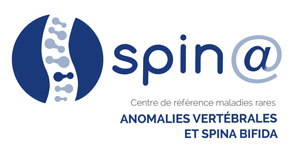The reference centre on rare diseases (Spin@) is a national structure dedicated to the care of patients with vertebral anomalies, spinal dysraphisms (“Spina Bifida”) and other rare vertebral and spinal cord malformations.
Spin@ was accredited as a CRMR in 2023 by the French Ministry of Health and Solidarity as part of the national “Rare Diseases” plan (decree of 26 December 2023, Journal Official no. 2023/24 of 29 December 2023). It is linked to the AnDDI-Rares – Developmental abnormalities and intellectual disability of rare causes (https://anddi-rares.org/) rare disease health network.
Spin@associates clinical teams with complementary skills to ensure consistent care for patients throughout France at all stages of life, from the foetal period, through childhood and adolescence, right up to adulthood.
Spin@ is based on extensive national coverage and is involved in organising prevention, screening and care from the prenatal period onwards. In conjunction with the medical colleges and scientific societies of the disciplines involved, our CRMR is involved in primary prevention for some of the diseases it covers. This primary prevention is based both on information campaigns aimed at the general public, on research to guide public health policies, and on information for healthcare professionals, particularly in relation effets tératogènes potentiels de certains médicamentsMalformative effects (increased risk of fetal malformations), or feto-toxic effects (risk of altering embryonic development and the health of the unborn child)...
Spin@ is developing standardised procedures for medical and surgical care, with the aim of optimising resources and ensuring the fullest possible social integration of both patients and their families. The care plan vision is personalised and holistic holistiquetake into account the whole human being, all his or her needs at the same time., with a focus on cooperation between the city and the hospital, and links with social workers in the areas concerned. This approach facilitates the implementation and optimisation at national level of common care programmes (recommendations and good practice) and therapeutic education programmes, enabling the care provided to be better adapted to the needs of patients and their families. Ambulatory care will be encouraged at every stage of the care process.
Spin@ is responsible for the qualitative and medico-economic evaluation of the various care plans. The CRMR shares clinical data via the French national rare disease databases (BAMARA and BNDMR). Our CRMR is very involved in the nomenclature of rare diseases, for which it provides expertise, and has updated the Orphanet nomenclature and classification of Spina Bifida and other Dysraphisms (SBoD) (see the Orphanet website)
All those involved in Spin@ are committed to sharing the most accurate, up-to-date and appropriate information with each of their contacts: patients, families, patient associations. This sharing also involves the other care sectors and the medical colleges and scientific societies of the disciplines involved. Education, training, care and research programmes run by the various members of our CRMR are primarily aimed at reducing the societal impact of vertebral and spinal cord malformations and also at achieving the greatest possible degree of anatomical, functional and psycho-social restoration for all patients.
The mission of the CRMR Spin@
« To improve diagnosis and care »
- To reduce diagnostic error, facilitate diagnosis and coordinate patient care.
- Define a therapeutic, psychological and social support strategy.
- Providing therapeutic education for patients and their families.
- Organise multidisciplinary consultations.
- Drawing up and distributing treatment protocols, in conjunction with the French National Authority for Health.
- Coordinating research activities.
- Developing training and disseminating information on rare diseases for health professionals, patients, and their families, in collaboration with patient associations.
- Organising national multidisciplinary consultation meetings for doctors.
- Organising events in partnership with patient organisations.
- Acting as the main point of contact for guardians and patient organisations.
